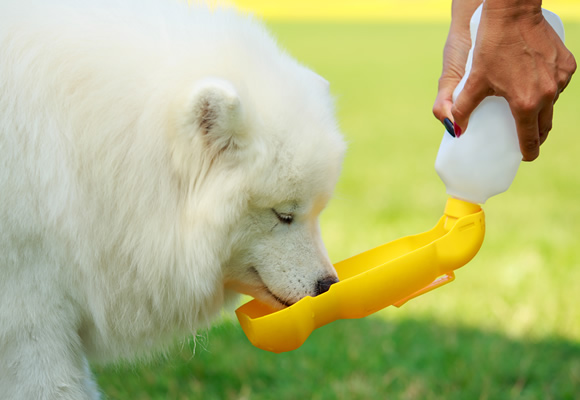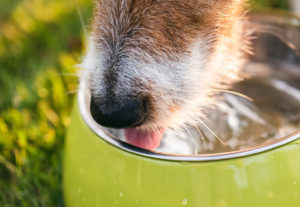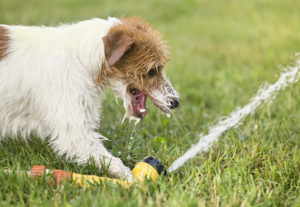 Good hydration is key during the “dog days of summer.” Dogs can become seriously ill – or even die – from losing as little as 10-15% of their body’s water. Dogs need at least an ounce of water per pound of weight daily – more if active. Hot weather makes dogs pant more and sweat through their paws.
Good hydration is key during the “dog days of summer.” Dogs can become seriously ill – or even die – from losing as little as 10-15% of their body’s water. Dogs need at least an ounce of water per pound of weight daily – more if active. Hot weather makes dogs pant more and sweat through their paws.
“Dehydration can promote urinary tract issues, the formation of kidney stones, and organ failure. It can be a veterinary emergency,” said Dr. Laurie Brush, founder of Heaven at Home Pet Hospice. “Senior dogs are at a higher risk.”
Symptoms may include lethargy, weakness, labored breathing, an elevated heart rate, and dry, sticky-feeling gums or sunken eyes.
How Can I Tell If My Dog Is Dehydrated?
Your pet’s mucous membranes should be moist. The easiest way to evaluate this is to check their gums. If they are sticky or dry when you run your finger over their gums, your pet may be mildly dehydrated.
If your pet is ill or has other symptoms, you can check further for dehydration by lifting a pinch of skin at the back of your pet’s neck/shoulder area and letting go. The skin should snap quickly back into place. If your pet is severely dehydrated, the skin may stick together, and form a “tent.” In this case, call your veterinarian immediately.
Improving Hydration
You might think drinking enough water is a simple biological function but in truth there are a number of things that put dogs off their water:
- Lack of water freshness/dust and debris
- Water bowl is in a high-traffic area
- Water bowl is at an uncomfortable height
- Dog is distracted by play activity and lacks access
- Dog feels unwell or nauseous, or is in too much discomfort to seek water
During hot weather, keep a water bottle nearby and take frequent H20 breaks during play, but note that deep-chested, large-breed dogs should not consume large volumes of water while highly active to avoid bloat, which can be fatal. Use dog fountains to keep water fresh via circulation. Place raised water bowls in multiple convenient locations. For pets with mild dehydration, encourage drinking by mixing in low-salt, low-fat chicken or beef broth, or a small amount of plain Pedialyte. But if your dog is clearly dehydrated, talk to your vet immediately. Hydration is your dog’s best friend in the dog days of summer!

When to Worry About Bloat
One caveat about hydrating your pet is taking care not to give a deep-chested dog copious amounts of water during vigorous play, as we mentioned above. That’s because it’s believed to contribute to bloat, also known as gastric dilatation-volvulus (GDV) complex. Bloat is a medical and surgical emergency that occurs when a dog’s stomach rotates or twists, trapping blood from the hind legs and abdomen from returning to the heart. Blood pools at the back end of the body, reducing the working blood volume and sending the dog into shock.
Dogs with a deep, narrow chest — very tall, rather than wide — suffer the most often from bloat. Great Danes, who have a high height-to-width ratio, are five-to-eight times more likely to bloat than dogs with a low height-to-width ratio. In addition to Great Danes, large- or giant-breed dogs at greatest risk include St. Bernards, Weimaraners, Irish Setters and Gordon Setters, Standard Poodles, and Doberman Pinschers. Males are twice as likely to bloat as females.
Signs of Bloat:
- An enlargement of the dog’s abdomen
- Retching
- Salivation
- Restlessness
- An affected dog will feel pain and might whine if you press on his belly
Without treatment, in only an hour or two, your dog will likely go into shock. The heart rate will rise and the pulse will get weaker, leading to death.
 Too Much Hydration?
Too Much Hydration?
On the other end of the dehydration spectrum is Water Intoxication, which, while rare, can happen. Does your dog “bite” at the water when swimming? Maybe they can fetch a stick in a pool or lake all day — ingesting water each time they do. Or maybe they love to drink from pressurized water like a sprinkler spigot. But the ingestion of too much water can throw their electrolytes out of balance and cause a life-threatening condition.
Symptoms of water intoxication in dogs include lack of coordination, lethargy, nausea, bloating, vomiting, dilated pupils, glazed eyes, light gum color, and excessive salivation. Advanced symptoms include difficulty breathing, collapsing, loss of consciousness, and seizures.
Because water intoxication in dogs can progress so quickly, time is critical. If your dog exhibits these symptoms, get to a veterinarian immediately to run blood work. A low level of electrolytes will confirm the condition. Treatment for water intoxication includes fluids, to put electrolytes back in the system, and sometimes a diuretic.
